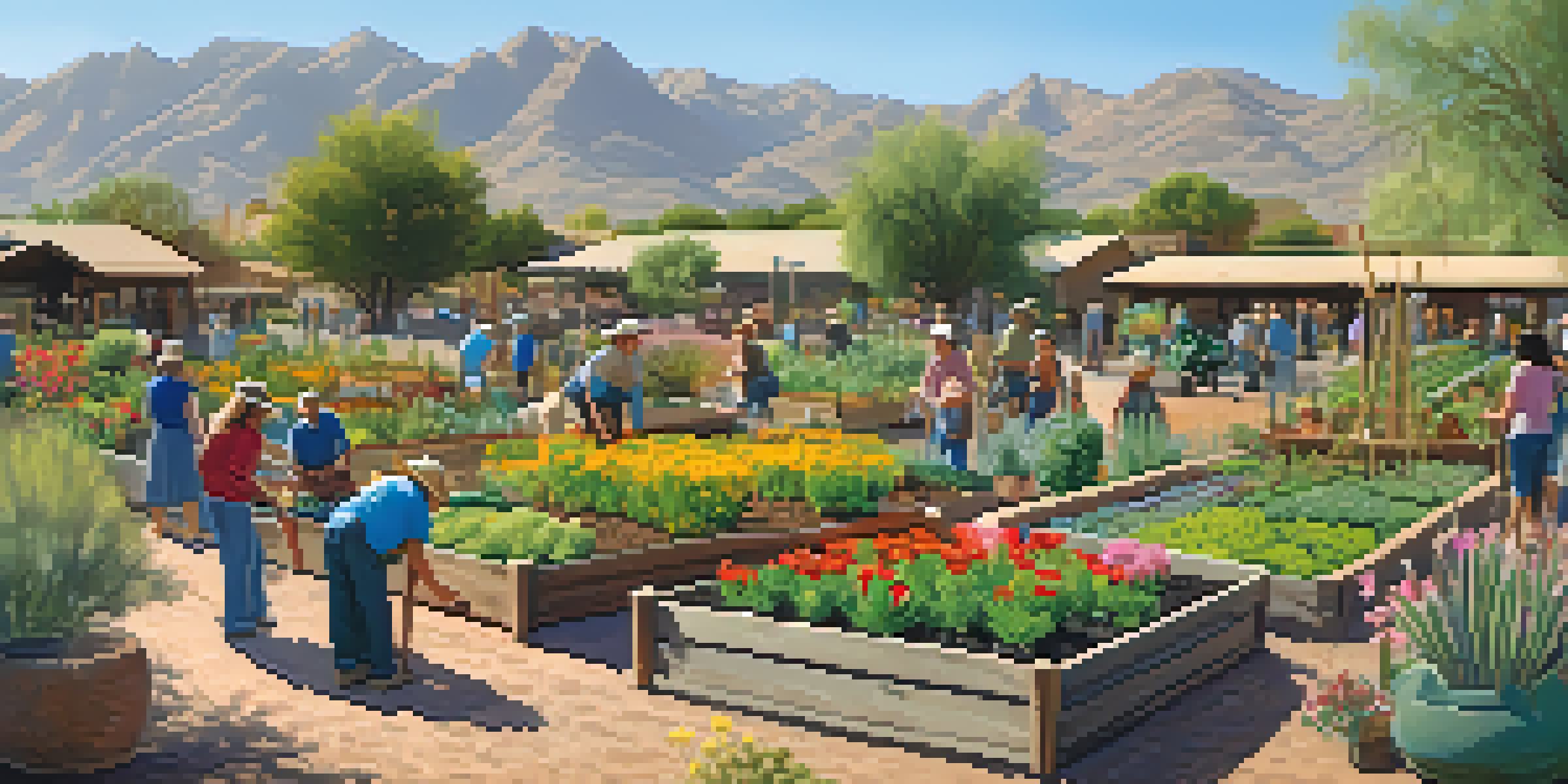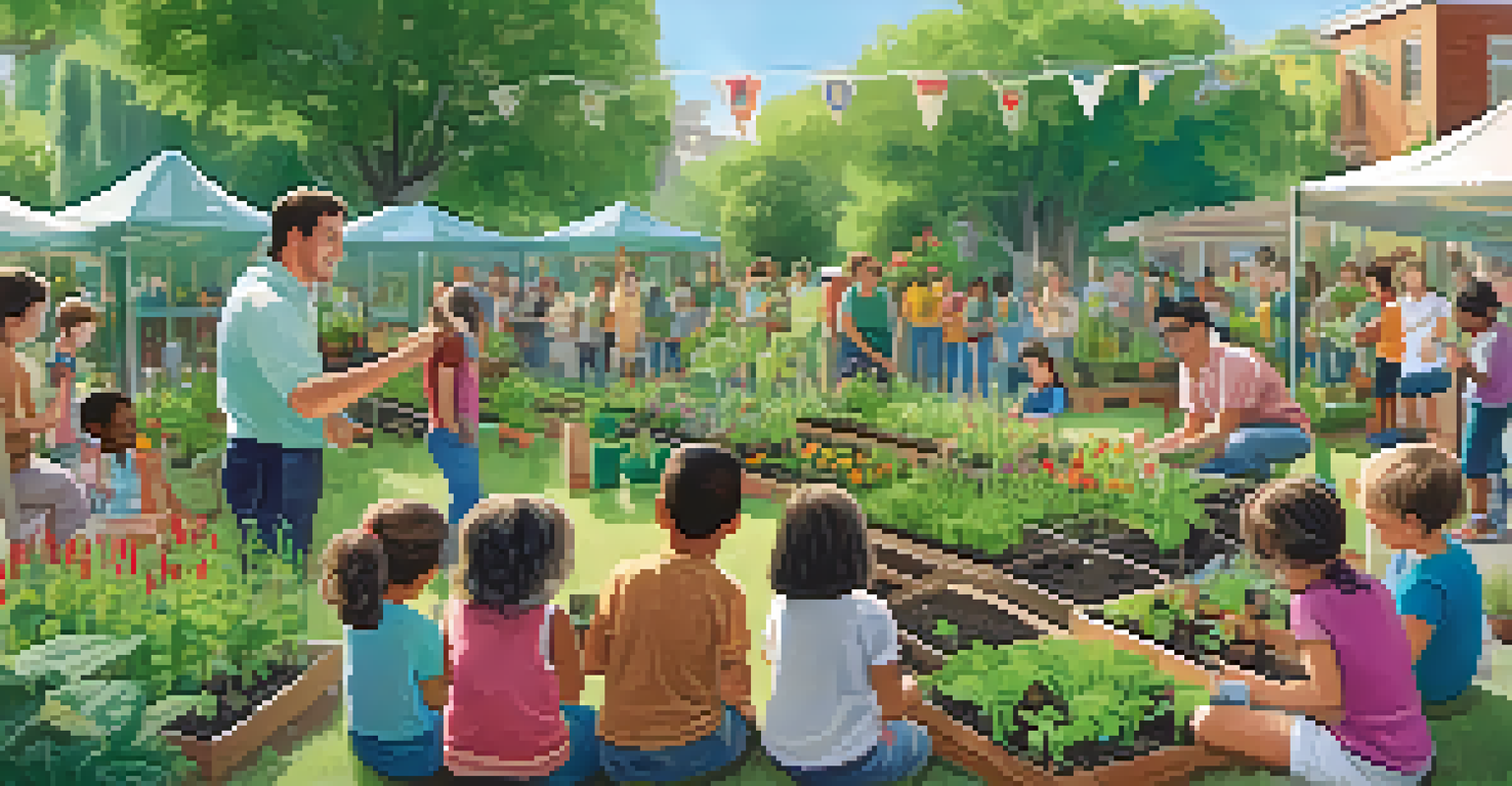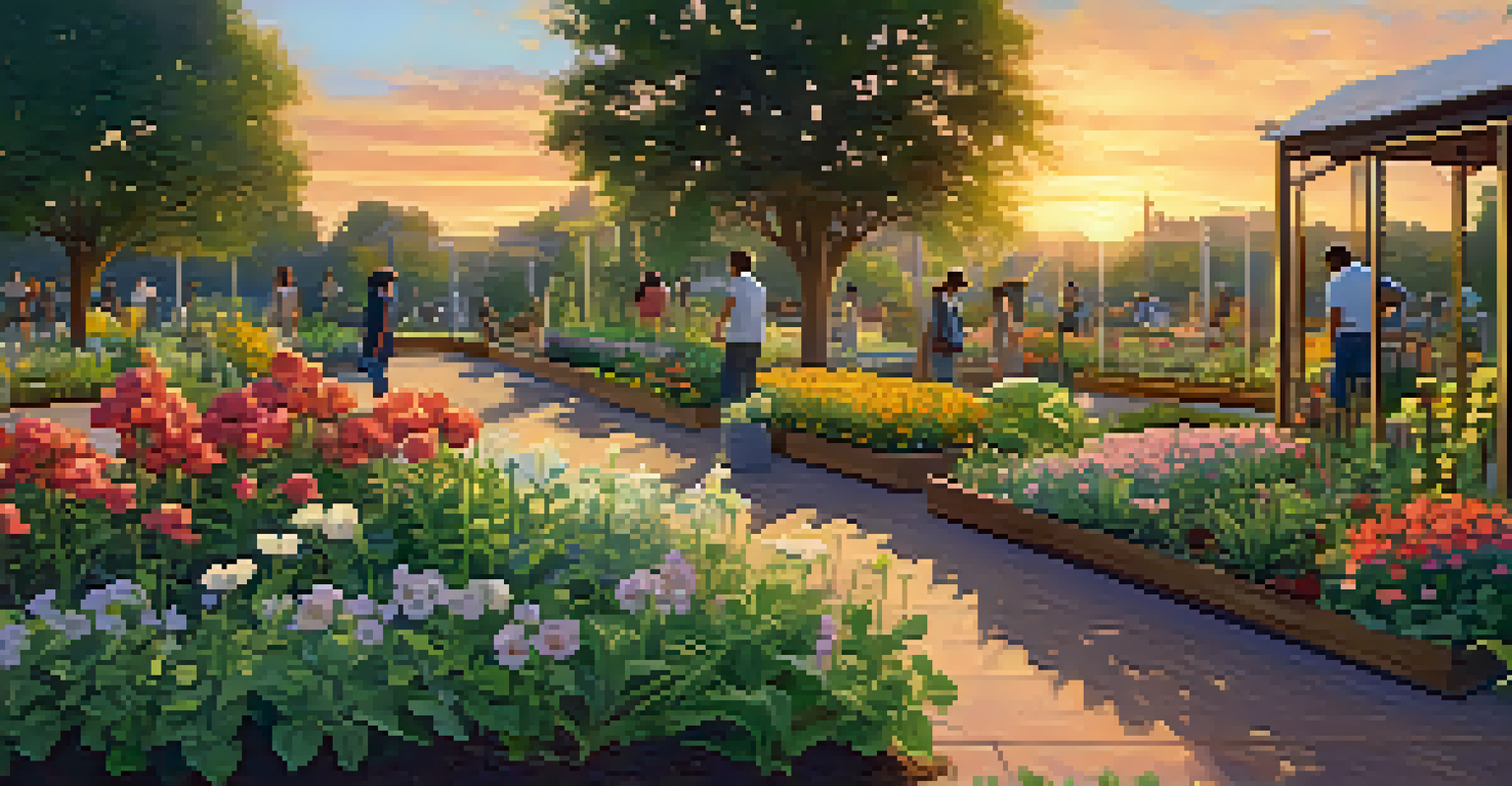Exploring the Benefits of Community Gardens in Scottsdale

Understanding Community Gardens in Scottsdale
Community gardens are shared plots of land where individuals come together to grow fruits, vegetables, and flowers. In Scottsdale, these gardens serve as green oases, transforming underutilized spaces into vibrant hubs of activity. They offer a unique opportunity for residents to cultivate not just plants, but also friendships and community spirit.
To plant a garden is to believe in tomorrow.
The concept of community gardening goes beyond just planting seeds; it's about fostering a sense of belonging. Residents of all ages can participate, creating a diverse tapestry of gardeners who share their knowledge and resources. Whether you're a seasoned gardener or a curious beginner, there's a place for everyone in these flourishing spaces.
In Scottsdale, many community gardens are designed to reflect the desert landscape, using native plants and sustainable practices. This not only enhances the beauty of the area but also promotes environmental stewardship among residents. By engaging in community gardening, individuals contribute to a healthier ecosystem while enjoying the fruits of their labor.
Promoting Healthy Lifestyles Through Gardening
One of the most significant benefits of community gardens in Scottsdale is their impact on health and wellness. Gardening encourages physical activity, providing a fun way to exercise while working outdoors. From digging and planting to weeding and watering, these activities help improve strength, flexibility, and overall fitness.

Moreover, growing your own fruits and vegetables fosters healthier eating habits. Community gardens often produce fresh, organic produce that is more nutritious than store-bought options. When residents have easy access to fresh food, they are more likely to incorporate these healthy choices into their diets, promoting better overall health.
Community Gardens Foster Connection
These shared spaces promote friendships and community spirit among residents, enhancing social ties.
Additionally, community gardening can also have mental health benefits. The act of nurturing plants and spending time in nature can reduce stress and anxiety, providing a therapeutic escape from daily life. Engaging with others in the garden creates a supportive environment that enhances emotional well-being.
Building Community Connections and Friendships
Community gardens are more than just places to grow food; they are social hubs where neighbors connect and collaborate. These gardens provide a sense of belonging, as people come together to share their skills, stories, and harvests. It's not uncommon for friendships to blossom over a shared love of gardening.
Gardening adds years to your life and life to your years.
Events and workshops often take place in community gardens, further strengthening these connections. From planting days to harvest festivals, residents gather to celebrate their achievements and learn from one another. These gatherings not only enhance gardening skills but also foster a sense of camaraderie among participants.
The diverse backgrounds of community gardeners contribute to a rich tapestry of cultures and experiences. This diversity encourages the exchange of ideas and practices, creating an inclusive atmosphere. In Scottsdale, these interactions help to break down barriers and promote understanding among residents.
Environmental Benefits of Community Gardens
Community gardens play a crucial role in enhancing local ecosystems. They promote biodiversity by providing habitats for various species, including pollinators like bees and butterflies. This increased biodiversity is vital for maintaining healthy ecosystems and ensuring the sustainability of local agriculture.
Additionally, community gardens contribute to improved air quality and reduced urban heat. The plants absorb carbon dioxide and release oxygen, helping to combat pollution in urban areas. In Scottsdale, where temperatures can soar, these green spaces help cool the surroundings, making neighborhoods more comfortable.
Gardening Supports Healthy Lifestyles
Engaging in community gardening encourages physical activity and access to fresh, nutritious produce.
Furthermore, community gardens often utilize sustainable practices such as composting and rainwater harvesting. These methods not only reduce waste but also promote responsible water usage in the arid climate of Scottsdale. By adopting eco-friendly techniques, community gardens set an example for residents to follow.
Educational Opportunities in Community Gardens
Community gardens serve as outdoor classrooms, providing valuable educational experiences for all ages. Many gardens in Scottsdale offer workshops and classes on topics like organic gardening, composting, and sustainable practices. These educational opportunities empower residents to make informed choices about their food and environment.
Children particularly benefit from hands-on learning experiences in community gardens. By getting their hands dirty, they learn about plant biology, nutrition, and the importance of environmental stewardship. These early lessons can instill a lifelong appreciation for gardening and nature.
Moreover, community gardens often partner with local schools and organizations to enhance their educational programs. These collaborations can lead to unique projects, such as school garden programs or field trips. By integrating gardening into the curriculum, educators can inspire the next generation of environmentally-conscious citizens.
Economic Advantages of Community Gardens
Community gardens can also provide economic benefits to Scottsdale residents. By growing their own produce, gardeners can save money on groceries, particularly when it comes to fresh fruits and vegetables. This is especially valuable for families seeking healthy options on a budget.
In addition to personal savings, community gardens can stimulate local economies. They often create opportunities for local businesses, such as farmers' markets, where gardeners can sell their surplus produce. This not only supports local agriculture but also fosters a sense of community pride.
Environmental Benefits Abound
Community gardens enhance local ecosystems, promote biodiversity, and improve air quality in urban areas.
Furthermore, community gardens can increase property values in the surrounding area. Well-maintained green spaces enhance the overall aesthetic of neighborhoods, making them more attractive to potential buyers. As a result, investing in community gardens can have lasting economic benefits for Scottsdale as a whole.
Challenges and Solutions for Community Gardens
While community gardens offer numerous benefits, they also face challenges that can hinder their success. Issues such as limited funding, land access, and maintenance can pose significant obstacles. However, with community involvement and support, many of these challenges can be overcome.
One effective solution is forming partnerships with local organizations and businesses to secure funding and resources. By collaborating with schools, non-profits, and government agencies, community gardens can access grants and materials necessary for growth. This teamwork not only strengthens the garden but also builds a sense of ownership among participants.

Another challenge is ensuring the sustainability of community gardens over time. This can be addressed by establishing clear rules and responsibilities for maintenance and operations. Encouraging active participation and creating a leadership structure within the garden can help ensure its long-term success and vitality.